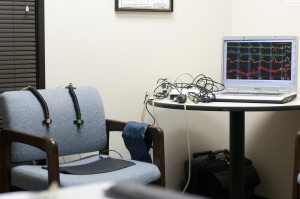
By Alex Sanders/reporter
Bob is in a small, enclosed room face to face with a strange man in his mid-30s.
Fluorescent light catches his every freckle, facial twitch and nervous tick. Tethered to a briefcase-sized device by wires connected to his chest and fingertips, Bob hears the man ask if he’s a female. He then asks if Bob knows anyone accused of something.
“Bob, do you have experience with money?” he asks.
“Tell me, Bob, what is your name?”
The stranger’s machine then spits out a roll of scribbled chart-paper.
It’s a polygraph, more commonly known as a lie detector test.
The phony questions have scientific validity in what’s called a Controlled Questions Test. According to author Allen K. Hess in The Handbook of Forensic Psychology, test results can lead to a lifelong prison sentence, prevent a job offer and disclose one’s private fantasies.
It does this by exploiting a person’s stress level.
“Belts placed around the upper thorax and abdomen provide two separate records of chest movements,” Hess writes. “Sweaty palms are detected by electrodes attached to fingertips.”
The Employee Polygraph Protection Act of 1988 eliminated most of the test’s widespread application. But, ironically, Hess says, the U.S. government exempted itself from coverage by this law “as a matter of national defense.”
This includes the Defense, Energy, Homeland Security, Justice and Treasury departments.
Daniel Sanders, TCC student and Army Reserve private first class, has been issued this test. Sanders said he was asked both generic and probing questions.
He recalls the order questions were asked as “random, thrown together and redundant.”
A polygraphist first asked Sanders if he were a female. He lied and said yes. The polygraph lit up.
CQT questions such as ”Are you a female?” and “What is today’s day?” are meant to be irrelevant, according to antipolygraph.org. Whether one lies or not, they establish a degree of expectation.
He then asked Sanders if he was affiliated with any drug dealers. Sanders said no.
“Pvt. Sanders, do you illegally buy, consume and smoke marijuana?”
“Wha… What?” Sanders replied. “No, sir, do you?”
These are considered relevant questions. They contain keywords like ”drug, weapon, illegal, crime” and a title followed by the name to elicit a reaction, according to Hess.
But Sanders’ case exhibits a major flaw in CQT. His first answer should have clearly answered the second question, too.
Polygraphists can put a negative bias on interviewee results in a forced reaction, according to antipolygraph.org.
Sanders said because he felt accused of a crime, stress symptoms curved up.
Hess considers that normal procedure “a meager method to identify a pathological liar.”



















